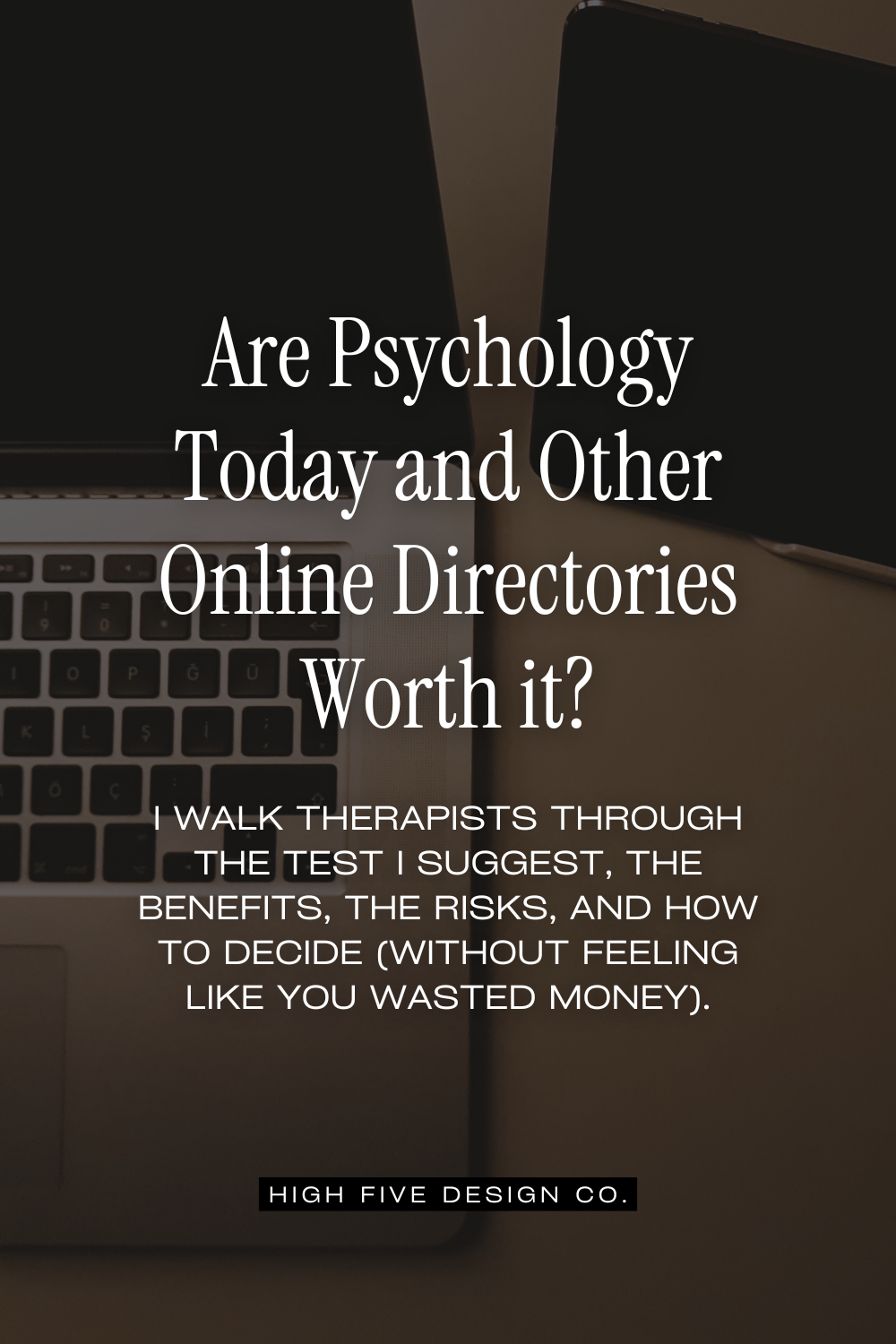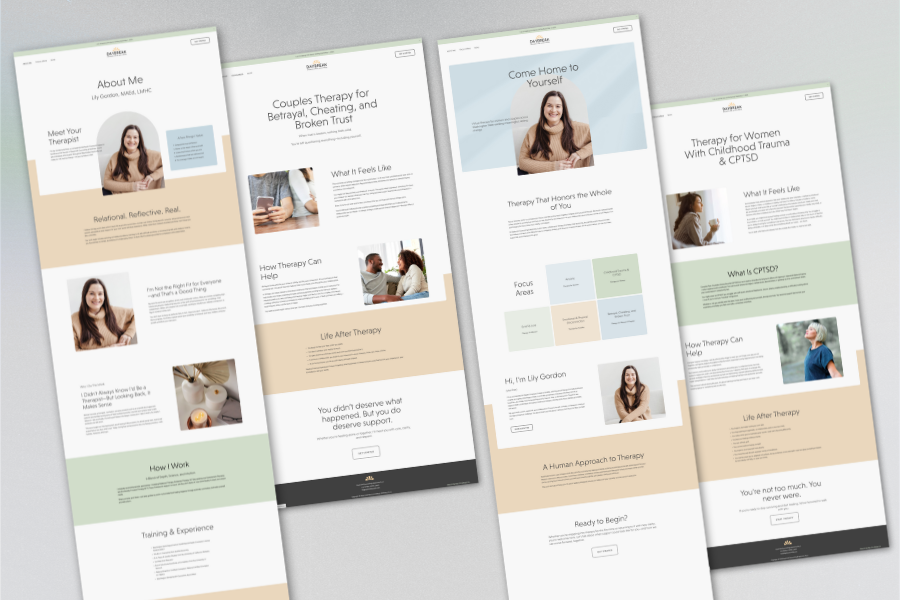Are Psychology Today and Other Online Directories Worth it?
Quick Answer for Skimmers (and Search Engines):
Psychology Today and other therapist directories can be worth it if they show up on the first page of Google when your ideal client searches for services like yours. They boost visibility and provide a steady stream of inquiries, especially for new therapists. The downsides are high competition, variable lead quality, and ongoing fees. If you’re fully booked or targeting a very specific niche, your time and money may be better spent optimizing your own website and referral sources.
Are Psychology Today and Other Online Directories Worth it?
If you’ve ever wondered whether paying to list yourself on Psychology Today (or any therapist directory) is actually worth it — you’re not alone. I get asked this question constantly.
The short answer is: yes sometimes, but it depends. Let me walk you through the test I suggest, the benefits, the risks, and how to decide (without feeling like you wasted money).
(Psst — if you want help writing a profile that actually stands out, check out my post How to Stand Out on Psychology Today: Copy Tips That Actually Work.)
Try the Client’s Eye Test First
Here’s a quick experiment I want you to do:
Open a private/incognito browser window (or clear your cookies).
Pretend you are your ideal client. What search would you type? Something like “anxiety therapist near me,” or “therapy for first responders,” or “EMDR therapist in Seattle.”
Hit Enter.
Scroll through the first page of search results.
Now ask:
Do any directory listings (e.g. Psychology Today, GoodTherapy, Zencare) appear on that first page?
If yes — those directories are the ones worth seriously considering.
If no — maybe your market is saturated, or SEO is pushing directories down. You’ll have to weigh whether the cost is worth it for you.
If a directory shows up on page one, that means it’s already pulling its weight (in terms of search visibility). If not, it might still help — but you’ll want to be extra strategic.
Even when a directory is showing up in search, there’s still a caveat: if you’re already fully booked, or you’re trying to attract only a hyper-specific niche, it may make more sense to funnel energy and dollars elsewhere.
Why Directories Can Be Worth It
Here’s why many therapists continue to use them:
Built-in visibility and SEO leverage: A well-ranked directory (especially big ones) often outrank new or less-optimized therapy websites. So you get visibility you might not otherwise get.
Steady inquiries (funnel opener): Some of your first clients may find you via directory sites. It’s like a marketing net that runs in the background.
Low maintenance: Once your profile is solid, you don’t need to babysit it daily. Check in periodically, but it’s less work than, say, writing new content monthly.
Psychological cred: Clients often perceive being listed in “big names” as a trust signal (“If they’re here, maybe they’re legit”). It’s like having a billboard in a well-trafficked area.
The Drawbacks You Don’t Want to Ignore
Directories are not magic. They come with trade-offs:
High competition: You’re one profile in a sea of others. If everyone in your region is also on the same platforms, you’ll need to have a sharper hook, better copy, stronger niche, or better photos to stand out.
Quality of leads varies: You’ll get inquiries from people who don’t really match your ideal client. Some will be out of budget, or expect something you don’t offer, or just browse without intention.
Recurring cost vs. ROI risk: Those monthly or annual fees add up. You might go months without a “client from the directory,” especially if your profile isn’t optimized.
Lack of control / platform changes: You don’t own the directory. They can change layout, algorithm, pricing, terms — and you can’t customize much beyond their templates.
How to Maximize Your Directory ROI
If after the client’s eye test you decide it might be worth it, here’s how to get more return:
Use that linked post above — How to Stand Out on Psychology Today: Copy Tips That Actually Work — to guide how you write your profile. (Yes, I’m cheekily linking you to it again because it’s helpful.)
Make sure your niche is super clear and front-loaded (so it shows in the search preview).
Invest in a decent, warm, approachable headshot (not a selfie in bad light).
Write the first few lines like ad copy: talk to the client’s pain, not your credentials or approach.
Include a call to action (e.g. free consult, “reach out and let’s see if we’re a fit”).
Monitor your inquiries: track which clients actually came through directories, and what percentage of your caseload they represent.
If a directory isn’t delivering enough clients (or good matches) after a trial period, cancel it and redirect the money / energy into things you control (SEO on your own website, referral networks, content marketing).
So… Worth It or Not?
Here’s my take:
If you’re new, building your reputation, and you want extra visibility, being on at least one well-ranked directory is a smart move (as long as you optimize your profile).
If you’re established and fully booked, you may already have better avenues for attracting clients — so it might be okay to skip—or at least pick only the very highest-value directories.
If your niche is narrow or premium and you want to filter into only a specific audience, you’ll want to lean more heavily into your website, content, referrals, and branding — rather than directories.
The key is: don’t “set and forget.” Do the client test. Try for a few months. Look at your real ROI. Then decide.
Pin it!
Some of My Favorite Private Practice Tools
Resources and Referral Links / CLICK FOR DISCOUNTS!

































